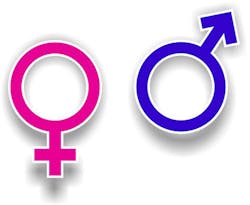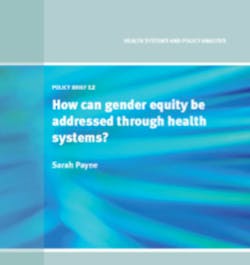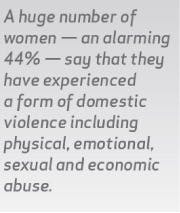Women at higher risk for allergies and asthma, but the reasons for differences are unclear. Women are more likely than men to have asthma, allergies and autoimmune diseases, according to a study presented at the annual meeting of the American College of Allergy, Asthma and Immunology in Baltimore.(1) This study was presented at a medical meeting, so it should be viewed as preliminary until published in a peer-reviewed journal.
Before puberty, boys are more likely than girls to have these health issues. However, that statistic changes when they become young adults, according to allergist Dr. Renata Engler. The reasons for these sex differences are complex and vary with age. There is a clear need for improved understanding of how sex and/or gender affects diagnosis, treatment and outcomes. As a review, Sex refers to biological differences; chromosomes, hormonal profiles, internal and external sex organs between males and females, and Gender describes the characteristics that a society or culture delineates as masculine or feminine. "The importance of sex differences in the practice of allergy-immunology cannot be overstated," Engler said in an ACAAI news release. "Improved sex/gender-based medicine and research practices will benefit men and women alike."(1) Genetics also play an important role in allergy and asthma risk. If parents have either of these conditions, their children are at increased risk. In Italy, the Chamber of Deputies of the Italian Parliament submitted legislation concerning “Gender Medicine” submitted to the Chamber on 5th of August, 2013.(2) According to the document, women and men will be affected by differing pathologies during their lifetime and will show differing symptoms even for the same pathology. Women fall ill more often and take more medication than men. Moreover, diseases common to both men and women such as osteoporosis, arthritis, and mental illnesses affect women more than men due to various factors such as biochemical, physiological and social differences.(2) It goes on to discuss cardiovascular diseases, the distinctive nature of female biology and behavior, and the current medical methodology of treating female patients as if they were male organisms. This practice places women at a disadvantage in relation to men, with serious shortcomings and unevenness in terms of the type of medical care they receive. The proposed bill includes six Articles.
In view of expert opinion on gender medicine, the World Health Organization has introduced the equity act lending weight to the idea that non-discrimination should be promoted through the provision of appropriate medical care.(3) In 2011, the European Parliament passed a resolution recommending that more attention be given to women’s health and inviting member states to encourage and support medical and pharmacological research into the specific pathologies that affect women at all ages. The Key Messages of the policy brief are: • Data on mortality, morbidity and use of health services reveal some important differences in health experiences between women and men. • Health systems can make important contributions to gender equality and gender equity by addressing gender in a variety of ways. • Identifying gender inequalities and addressing gender equity are also central to good stewardship of health systems.
And finally, in the USA, a survey finds significant link between chronic health conditions and domestic violence.(4) A significant link exists between many chronic health conditions and domestic violence, and the healthcare industry, support agencies and others must do more to recognize and act on that connection. Those calls to action were the key conclusions of a recent nationwide survey sponsored by the Verizon Foundation and MORE Magazine, presented Thursday, Nov. 14, 2013, at a Capitol Hill briefing. The survey makes a compelling case for healthcare providers to screen women for domestic violence. Since the data shows that survivors of domestic violence have much higher rates of chronic health conditions, it is imperative for screenings to take place.
For more information, view the survey(4) and the White Paper: Domestic Violence and the Role of the Healthcare Provider, The Value of Educating on Assessment and Intervention Strategies.(5)
References
1. American College of Allergy, Asthma and Immunology, news release, Nov. 8, 2013.
2. http://genderedinnovations.stanford.edu/policy/ItalianNationalGenderMedicineBill2013.pdf.
3. http://www.euro.who.int/__data/assets/pdf_file/0006/64941/E92846.pdf.
4. http://responsibility.verizon.com/assets/docs/VZF_MORE_GfK_Survey_v2_HIGH_RES.pdf.
5. http://responsibility.verizon.com/assets/docs/WhitePaper_DomesticViolence.pdf.











